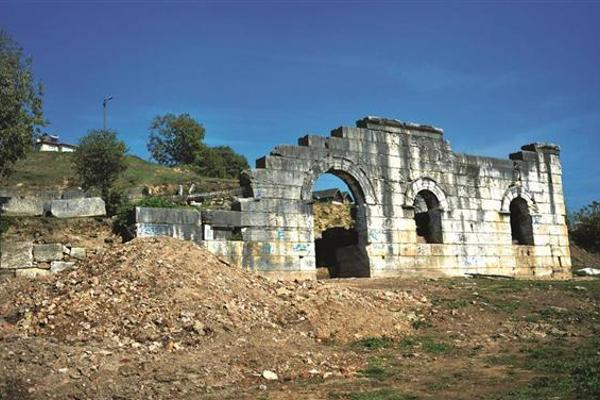New project aims to reveal archeology around Black Sea
DÜZCE - Anadolu Agency


The teams will also research settlement places that were discovered with the excavations of the ancient city Prusias Ad Hypium. AA photo
A new project aims to reveal the ancient places and cities of the Western Black Sea region. The project, The Surface Research Project, will be held by Düzce University Archaeology department academics.Academic Nurperi Ayengin spoke to the Anadolu Agency about the project and said the project will take six years, with the permission of Museums and Cultural Entities General Directorate.
“The project is very important to discover the settlements in the area,” Ayengin said, adding the project will start at Düzce’s Akçakoca district and Konuralp neighborhood. “It will continue from north to west,” she added.
Noting that before there has not been another research like this in western Black Sea region, Ayengin said: “We will find settlements in the archaeology maps and we will have a wide source of information on the settlements and the history about them.” The teams will also research settlement places that were discovered with the excavations of the ancient city “Prusias Ad Hypium.” Ayengin said Prusias ad Hypium is a Catholic titular see. It was near present-day Düzce.
Noting findings will be valuable and important for archeology, she said there are many settlements from ancient cities in the western Black Sea region. “If we will be able to make them visible and discover them, history will be driven into light and new era for archeological history may begin.”
In the past five years, there have not been any excavations in the Black Sea region, said Ayengin. On the other hand, it is known that ancient trade routes in the region are currently being extensively studied by scientists, as the Black Sea was sailed by Hittites, Carians, Thracians, Greeks, Persians, Cimmerians, Scythians, Romans, Byzantines, Goths, Huns, Avars, Bulgars, Slavs, Varangians, Crusaders, Venetians, Genoese, Lithuanians, Georgians, Poles, Tatars, Ottomans and Russians.
The most promising areas in deep water archaeology are the quest for submerged prehistoric settlements in the continental shelf and for ancient shipwrecks in the anoxic zone, which are expected to be exceptionally well preserved due to the absence of oxygen. This concentration of historical powers, combined with the preservative qualities of the deep anoxic waters of the Black Sea, has attracted increased interest from marine archaeologists who have begun to discover a large number of ancient ships and organic remains in a high state of preservation.
